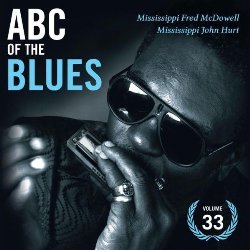ABC of the Blues CD34 (2010)
ABC of the Blues CD34 (2010)

CD34 - Robert Nighthawk & Johnny Otis 34-01 Robert Nighthawk – Crying Won’t Help You 34-02 Robert Nighthawk – Seventy-Four 34-03 Robert Nighthawk – Nighthawk Boogie 34-04 Robert Nighthawk – Kansas City play 34-05 Robert Nighthawk – Bricks in My Pillow 34-06 Robert Nighthawk – Maggie Campbell 34-07 Robert Nighthawk – Feel So Bad 34-08 Robert Nighthawk – You Missed a Good Man 34-09 Robert Nighthawk – The Moon Is Rising 34-10 Robert Nighthawk – Take It Easy, Baby 34-11 Johnny Otis – Good Ole Blues 34-12 Johnny Otis – Mean Ole Gal 34-13 Johnny Otis – Hangover Blues 34-14 Johnny Otis – Thursday Night Blues 34-15 Johnny Otis – I Gotta Guy 34-16 Johnny Otis – Get Together Blues play 34-17 Johnny Otis – Double Crossing Blues 34-18 Johnny Otis – Head Hunter 34-19 Johnny Otis – Going to See My Baby 34-20 Johnny Otis – New Orleans Shuffle
Robert Lee McCollum (30 November 1909–5 November 1967) was an American bluesman who played and recorded under the names Robert Lee McCoy and Robert Nighthawk.
Born in Helena, Arkansas, he left home at an early age to become a busking musician, and after a period wandering through southern Mississippi settled for a time in Memphis, Tennessee. There he played with local orchestras and musicians, such as the Memphis Jug Band. A particular influence was Houston Stackhouse, from whom he learnt to play slide guitar, and with whom he appeared on the radio in Jackson, Mississippi.
After further travels through Mississippi, he found it advisable to take his mother’s name, and as Robert Lee McCoy he moved to St. Louis, Missouri. Local musicians with whom he played included Henry Townsend, Big Joe Williams, and Sonny Boy Williamson. This led to two recording dates in 1937, the four musicians recording together at the Victor Records studio in Aurora, Illinois, as well as recordings under his own name, including “Prowling Night-Hawk” (recorded 5 May 1937), from which he was take his later pseudonym.
These sessions led to Chicago careers for the other musicians, but not for McCoy, who simply continued his rambling life, playing and recording (for Victor/Bluebird and Decca) solo and with various musicians, under various names. He also became a familiar voice on local radio stations. Then Robert Lee McCoy disappeared.
Within a few years he reappeared as the electric slide-guitarist Robert Nighthawk, and began recording for Chess Records. This was also Muddy Waters’ label; the two men’s styles were close enough that they were in competition for promotional activity — and as Waters was the more saleable commodity, being more reliable and a more confident stage communicator, he received the attention. Though Nighthawk continued to perform and to record, he failed to achieve any great commercial success.
In 1963, some ten years later, Nighthawk was discovered busking in Chicago, and this led to further recording sessions and club dates, and to his return to Arkansas, where he appeared on the King Biscuit Time radio programme. He had a stroke, followed by a heart attack, and died at his home in Helena.
Johnny Otis (born Ioannis (Yannis) Veliotes on December 28, 1921 in Vallejo, California) is an American blues and rhythm and blues pianist, vibraphonist, drummer, singer, bandleader, and impresario. Johnny Otis was one of the most prominent white figures in the history of black R&B.
After playing in a variety of swing orchestras, including Lloyd Hunter’s Serenaders, he founded his own band in 1945 and had one of the most enduring hits of the big band era, “Harlem Nocturne”. This band played with Wynonie Harris and Charles Brown. In 1947 he and Bardu Ali opened the Barrelhouse Club in the Watts district of Los Angeles. He reduced the size of his band and hired singers Mel Walker, Little Esther Phillips and the Robins (who later became the Coasters). He discovered the teenaged Phillips when she won one of the Barrelhouse Club’s talent shows. With this band, which toured extensively throughout the United States as the California Rhythm and Blues Caravan, he had a long string of rhythm and blues hits through 1952.
In the late 1940s he discovered Big Jay McNeely, who then performed on his Barrelhouse Stomp. In the 1950s he discovered Etta James, for whom he produced her first hit, Roll With Me, Henry, (also known as The Wallflower). Otis produced the original recording of Hound Dog written by Jerry Leiber and Mike Stoller with vocal by Big Mama Thornton, and was given a writing credit on all six of the 1953 releases of the song.
download (mp3 @320 kbs):
yandex 4shared mediafire ulozto gett bayfiles
Last Updated (Monday, 19 August 2019 21:44)








